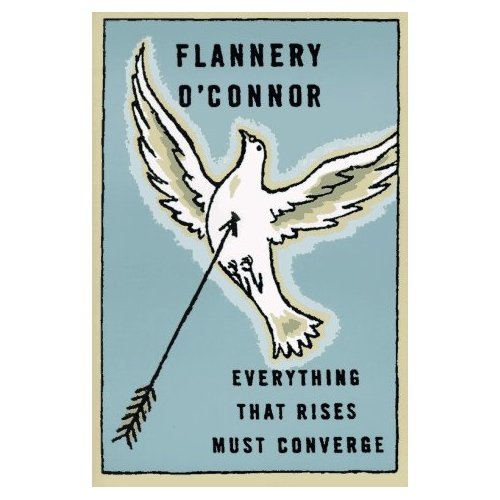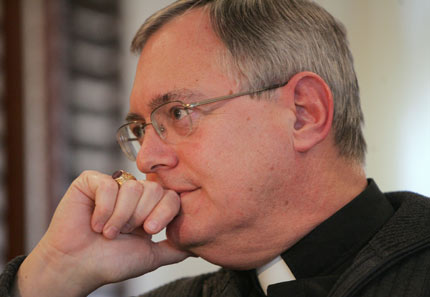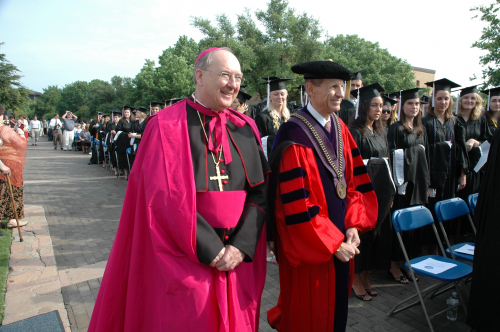Everything That Rises Must Converge
Everything That Rises Must Converge is a story in Flannery O’Connor’s book of the same name. It is a tale of nostalgia, prejudice, relationships, superiority, resentment, and ultimately, the space between people who perceive the same thing differently. 
The title is a quotation from Catholic theologian Pierre Teilhard de Chardin, who imagined an “omega point†at which the “rising†or evolving human being would meet God.
I see the rising as a metaphor describing the struggle, debate and entanglement of the many different strands and tendrils of thought, belief, and action over what it means to be Catholic. And, at the end, where the distances close as we all meet in God.
The debate over Catholic identity has exposed two extremes in Catholicism: what author and scholar George Weigel calls “Catholic lite,” meaning a form of faith sold out to seclarism; and what analyst and correspondent John L. Allen, Jr. terms “Taliban Catholicism,” meaning an angry expression of Catholicism that knows only how to excoriate and condemn.
In recent days there has been a very public exchange between Thomas J. Tobin, Bishop of Providence, Rhode Island, and Sen. Patrick Kennedy, D-Rhode Island, over the senator’s support of an amendment to the health care bill before Congress. The amendment addresses public financing of abortions.
In a letter published in the diocesan paper and on their website, Bishop Tobin wrote to Senator Kennedy saying, “For the moment I’d like to set aside the discussion of health care reform, as important and relevant as it is, and focus on one statement contained in your letter of October 29, 2009, in which you write, “The fact that I disagree with the hierarchy on some issues does not make me any less of a Catholic.†That sentence certainly caught my attention and deserves a public response, lest it go unchallenged and lead others to believe it’s true. And it raises an important question: What does it mean to be a Catholic?” 
“Although I wouldn’t choose those particular words, when someone rejects the teachings of the Church, especially on a grave matter, a life-and-death issue like abortion, it certainly does diminish their ecclesial communion, their unity with the Church. This principle is based on the Sacred Scripture and Tradition of the Church and is made more explicit in recent documents.”
“But let’s get down to a more practical question; let’s approach it this way: What does it mean, really, to be a Catholic? After all, being a Catholic has to mean something, right?”
“Well, in simple terms – and here I refer only to those more visible, structural elements of Church membership – being a Catholic means that you’re part of a faith community that possesses a clearly defined authority and doctrine, obligations and expectations. It means that you believe and accept the teachings of the Church, especially on essential matters of faith and morals; that you belong to a local Catholic community, a parish; that you attend Mass on Sundays and receive the sacraments regularly; that you support the Church, personally, publicly, spiritually and financially.”
“In your letter you say that you “embrace your faith.†Terrific. But if you don’t fulfill the basic requirements of membership, what is it exactly that makes you a Catholic? Your baptism as an infant? Your family ties? Your cultural heritage?”
I cannot fault the bishop in the points he raises about being a Catholic and the questions he poses to Senator Kennedy publicly. In his role as teacher and pastor he should do so.
However, what I am uncomfortable is the reduction of anyone’s Catholic identity to one issue – abortion. It seems to me that “pro-life” Catholics –bishops included–need to have the same unwavering commitment to feeding, clothing, housing and educating children and young adults; and keeping them out of wars and death row prison sentences.
In a 2006 study by Elizabeth Oldmixon and William Hudson – When Church Teachings and Republican Ideology Collide: The Perspectives of Catholic Republicans in the House of Representatives, a sampling of Catholic Republicans justified not supporting Catholic Social Teaching by seeing its application to most domestic social issues as less authoritative than Church moral teachings on issues like abortion.
On March 10, 2006, the U.S. Conference of Catholic Bishops issued a “Statement on Responsibilities of Catholics in Public Life.” The bishops were very firm and unqualified in their oppositionto abortion, but their remarks were not limited to this one issue.
“Our faith has an integral unity,” they said, “that calls Catholics to defend human life and human dignity whenever they are threatened. A priority for the poor, the protection of family life, the pursuit of justice and the promotion of peace are fundamental priorities of the Catholic moral tradition which cannot be ignored or neglected. We encourage and will continue to work with those in both parties who seek to act on these essential principles in defense of the poor and vulnerable.”
I really liked what Kevin J. Farrell, Bishop of Dallas said in his May 17, 2009 commencement address at the University of Dallas, an independent Catholic University in Irving, Texas. “If and when others may disagree or have a different approach or have a different slant on Catholic teaching or belief, honest debate, not confrontation, true dialogue, where we seek to understand the other, not facile condemnation, should be the overreaching way we move forward together,” he said in his address. 
Bishop Farrell posed the question, “What does it mean to be Catholic enough?” and offered several possible answers: “It means adhering to the magisterium of the church and taking very seriously the length, breadth and depth of Catholic tradition…It means taking very seriously the challenge which theologians in the church have always taken up – to face into and revere the contemporary culture and to relate revelation and our Catholic faith to that culture…It does not mean parroting words and phrases from one or another time and place in the church’s history as though that were the only way to speak of things divine and of things Catholic…It means being a leaven in a society that seeks insight, example and inspiration even as it claims to be postreligion, postchurch and post-Christianity.”
“It means being humble before God and each other, acknowledging that no one of us has all the answers to the question, What does it mean to be Catholic enough? We know well that no one of us can ever have all the answers. No theologian or professor or pope has ever had or ever will have all the answers to what it means to be authentically and fully Catholic.”
